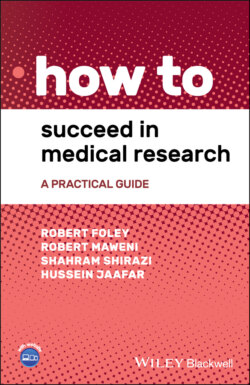Читать книгу How to Succeed in Medical Research - Robert Foley Andrew - Страница 6
Preface
ОглавлениеOver the last few decades, there has been a push towards evidence‐based medicine, with the medical fraternity recognising and embracing the improved outcomes brought about by this approach. Central to this is the ability of healthcare professionals across all levels to be able to understand and undertake scientifically sound efforts to gather and learn from this evidence. This can be on a local level, for example, departmental audits, or on a national or international level, as is the case with large randomised controlled trials. Unfortunately, although academic medicine topics such as research and teaching are often discussed and taught at medical schools – many of which are at the forefront of international research efforts – medical students and junior doctors rarely get the chance to participate in any real‐world studies, or indeed critique any practice changing studies in a meaningful way for themselves. The situation in regard to teaching is similar. Peer‐to‐peer teaching opportunities may be limited to self‐arranged sessions with little to no guidance or formal training in how to do this key task, which will be crucial for the rest of one's career.
This is despite these activities being recognised as essential by undergraduate and postgraduate educators. In fact, they are a key part of selection for postgraduate employment. Candidates who demonstrate awareness of and proficiency with research and other academic activities such as teaching are highly sought after. However, many candidates, particularly those who don't take time out of their undergraduate programmes or pursue a higher degree, tend not to have had the exposure and opportunities to engage with these academic activities as students and junior healthcare professionals. Many will have never undertaken any formal research or teaching during this time. Furthermore, we have found that many students with an interest in medical research don't have the skills and experience required to get started, and they may lack mentors and senior colleagues with the time, interest, or experience to help them.
We were fortunate that, at an early stage in our training, either as students or junior doctors, we had access to high‐quality research units with experienced mentors. This nurtured our interest, and we have since sought higher research degrees that have allowed us to explore this further. We have written this book for those who do not get this opportunity. This book is a guide to help at each step of the research process, providing personal examples to help you get started in medical research and to solve many of the challenges that you may encounter during this process.
This book will also be useful for any individual seeking to improve his or her knowledge and skills in medical research for personal use and for interview and examination preparation purposes. We have written this in a very practical manner, with real‐life examples, with the hope that you will embrace the process and carry out meaningful research and teaching that is of interest to you and of benefit to the medical community.
Robert FoleyRobert MaweniShahram ShiraziHussein Jaafar
